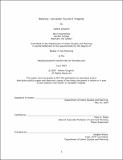| dc.contributor.advisor | Terry S. Szold. | en_US |
| dc.contributor.author | Gingrich, Valerie (Valerie J.) | en_US |
| dc.contributor.other | Massachusetts Institute of Technology. Dept. of Urban Studies and Planning. | en_US |
| dc.date.accessioned | 2008-01-10T14:25:58Z | |
| dc.date.available | 2008-01-10T14:25:58Z | |
| dc.date.copyright | 2007 | en_US |
| dc.date.issued | 2007 | en_US |
| dc.identifier.uri | http://hdl.handle.net/1721.1/39849 | |
| dc.description | Thesis (M.C.P.)--Massachusetts Institute of Technology, Dept. of Urban Studies and Planning, 2007. | en_US |
| dc.description | This electronic version was submitted by the student author. The certified thesis is available in the Institute Archives and Special Collections. | en_US |
| dc.description | Includes bibliographical references (p. 65-67). | en_US |
| dc.description.abstract | Lancaster County, Pennsylvania residents are proud of their agricultural heritage. They do not want to see their farmland disappear. But the County continues to be developed into residential subdivisions. This thesis explores the inconsistency in the perspectives and actions of residents regarding farmland preservation and development. Contrary to what you might expect, those in the County who want to preserve farmland and those who are developing the land are often the same people. Individuals talk about the importance of saving farmland, even though they just bought a home that was built on what was an active farm. Farmers, who have a deep connection with the County's land and know its importance, choose to develop their farms. It's not a complete mystery as to why this is happening, but it is a wonder how these individuals deal with their personal inconsistencies. How do such individuals confront the inconsistencies that they face? Furthermore, how do they justify their actions regarding the development of farmland? How do these groups of people as individuals see themselves in relation to the conflict between farmland preservation and development? Are they simply ambivalent? | en_US |
| dc.description.abstract | (cont.) In an attempt to find out, I interviewed Lancaster County residents in two locations in the County where a farm had been developed into their single family homes. The farmer owners/developers were interviewed as well. The interviewees respond in numerous ways, but they all expressed a desire for balance. They support farmland preservation efforts, but they also believe that growth is necessary. This "balance" is how they expressed their ambivalence towards the subject. The interviews showed specific ways that information can enlighten the balance between development and farmland preservation. The County government is encouraged to take on the provision of information as a tool of intervention in this area. An informed public can then make better choices as to what the "balance" will look like. Local governments are responsible for implementing this balance by using zoning to control and direct development away from the County's agricultural land. Coordinated action in the County is required to avoid the County's farming character tragically disappearing. | en_US |
| dc.description.statementofresponsibility | by Valerie Gingrich. | en_US |
| dc.format.extent | 67 p. | en_US |
| dc.language.iso | eng | en_US |
| dc.publisher | Massachusetts Institute of Technology | en_US |
| dc.rights | M.I.T. theses are protected by copyright. They may be viewed from this source for any purpose, but reproduction or distribution in any format is prohibited without written permission. See provided URL for inquiries about permission. | en_US |
| dc.rights.uri | http://dspace.mit.edu/handle/1721.1/7582 | |
| dc.subject | Urban Studies and Planning. | en_US |
| dc.title | Balance : Lancaster County's tragedy | en_US |
| dc.type | Thesis | en_US |
| dc.description.degree | M.C.P. | en_US |
| dc.contributor.department | Massachusetts Institute of Technology. Department of Urban Studies and Planning | |
| dc.identifier.oclc | 182816124 | en_US |
